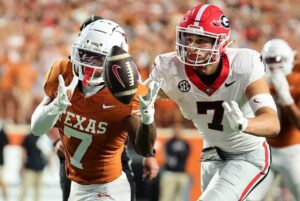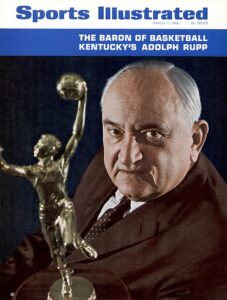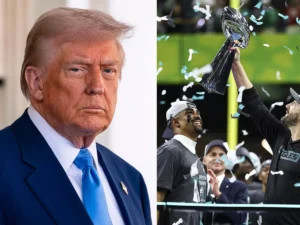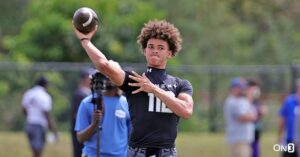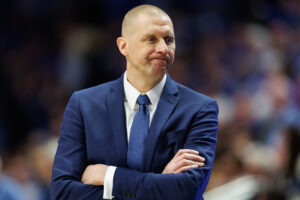
Jalen Hurts will not accompany his Philadelphia Eagles teammates to the White House, according to a new report.
In a development that has sparked widespread conversation across both the NFL and political spheres, Philadelphia Eagles quarterback Jalen Hurts will reportedly not join his teammates for their upcoming visit to the White House. While the organization has remained tight-lipped and Hurts himself has yet to issue a public statement, the quarterback’s absence from the high-profile event is being interpreted in numerous ways, fueling speculation about his motivations, values, and the broader cultural moment in American sports.
According to a report first released by a team insider and later confirmed by multiple league sources, Hurts informed team officials in advance that he would not be attending the White House ceremony honoring the Eagles. The event, part of a longstanding tradition for championship-contending teams or those recognized for excellence, is expected to include players, coaches, executives, and other personnel from the organization. However, Hurts’ decision to skip the event raises questions about the reasons behind his choice and what it may signal moving forward.
Jalen Hurts has never been one to shy away from doing things his own way. Since his college days at Alabama and Oklahoma, Hurts has carved out a reputation as a quiet leader — poised, thoughtful, and resilient. His on-field toughness has mirrored his off-field dignity. Whether dealing with a benching in the national championship game at Alabama or emerging as a second-round NFL draft pick amid doubts, Hurts has consistently responded with maturity.
Now entering another chapter in his evolving leadership journey, Hurts’ decision to skip the White House visit could be seen as a reflection of his convictions. Whether his absence is due to personal, political, religious, or scheduling reasons, one thing is clear: this is not a move made lightly.
Hurts joins a growing list of professional athletes who have chosen not to attend White House visits in recent years. Since the early 2000s, high-profile players from various sports — including NBA stars LeBron James, Stephen Curry, and Kawhi Leonard, as well as NFL figures like Tom Brady and Devin McCourty — have made headlines for skipping the ceremonial trip.
In some cases, athletes have declined for political reasons, disagreeing with the policies or leadership of the sitting administration. Others have cited personal or family reasons, offseason commitments, or logistical challenges. Given the symbolic nature of the White House visit, any absence tends to generate headlines, even when the player provides a clear reason.
As of now, no official explanation has been provided for Hurts’ absence. That vacuum of information has allowed speculation to flourish on talk shows, sports radio, and social media.
Hurts is known for carefully choosing his words and maintaining a low profile. He often refrains from commenting on divisive topics and prefers to lead through action rather than rhetoric. This temperament makes his decision all the more intriguing. Some view the move as an act of quiet protest. Others suggest it might be unrelated to politics and simply a matter of personal preference or scheduling.
Hurts has previously spoken about his deep Christian faith, his strong family values, and his focus on football. Any of these could potentially explain his decision. It’s also possible that Hurts, a methodical thinker and planner, did not want to detract from the team’s image or bring unnecessary attention to himself during a celebratory occasion. His silence, in that light, might be a continuation of his steady approach.
As of this writing, neither the Philadelphia Eagles organization nor any of Hurts’ teammates have publicly commented on his absence. The Eagles have long prided themselves on supporting diverse voices in the locker room, encouraging players to express themselves and stay true to their beliefs. Hurts, who signed a five-year, $255 million extension in 2023 and is widely regarded as the face of the franchise, holds immense respect within the team.
Sources close to the organization indicate that Hurts notified the team early enough that his absence was not a surprise. Internally, the Eagles reportedly see the matter as a non-issue, with no signs of friction between Hurts and other team leaders. That cohesion will be vital heading into what is expected to be another competitive season for Philadelphia.
Hurts’ decision also adds fuel to the ongoing discussion about the role of athletes in civic and political discourse. Over the last decade, the landscape of professional sports has shifted. Players are no longer expected to “stick to sports.” Instead, many are using their platforms to advocate for social justice, speak on political matters, or make personal statements — both subtle and bold.
When Colin Kaepernick began kneeling during the national anthem in 2016, the act was polarizing but transformative. It opened the door for athletes to consider how their presence — or absence — could make a statement. While Hurts has not explicitly aligned with activist movements in the same way, his calculated actions and public demeanor suggest someone who is fully aware of the implications of his choices.
Even in silence, Hurts communicates volumes.
The media’s reaction has been mixed. Supporters of Hurts have praised his right to make a personal decision, noting that attendance at White House visits is voluntary and symbolic rather than obligatory. They argue that in a country that values individual freedom, Hurts should not be criticized for choosing a different path.
Critics, however, have pointed to his role as a team leader and public figure, suggesting that his absence sends the wrong message. Some pundits believe he missed an opportunity to bridge divides and celebrate the team’s success in a unifying setting.
As always, the public is divided. But this is not new territory for athletes in Hurts’ position — and the 25-year-old quarterback seems prepared to shoulder whatever comes his way.
Jalen Hurts has carefully cultivated a personal brand rooted in hard work, humility, and purpose. With major endorsement deals from companies like Nike, Beats by Dre, and Lemon Perfect, Hurts has broad appeal across demographics. His clean image and professionalism have made him a marketable face of the NFL.
Choosing not to attend the White House could affect his image in some circles — positively or negatively — but Hurts is likely focused on the bigger picture. In today’s social media age, athletes face constant scrutiny, but Hurts has consistently shown that he won’t let outside noise dictate his decisions.
Will Hurts’ absence have long-term consequences? In football terms, likely not. The Eagles’ coaching staff and front office understand the modern NFL ecosystem, where player empowerment is paramount. If anything, the episode could serve as a rallying point — a reminder that even within a team, individual voices matter.
What remains to be seen is whether Hurts will eventually address the situation himself. If he chooses to speak, it could provide clarity and reaffirm his values. If he remains silent, it will be in keeping with his style: calm, focused, and undistracted.
Ultimately, Hurts’ decision is one moment in a long season — a symbolic gesture in a symbolic event. But in a league where quarterbacks are often judged for far more than their passer rating, every action is amplified. Whether you interpret his absence as a statement, a scheduling conflict, or a personal choice, it adds another layer to the complexity of Jalen Hurts — a player who continues to lead, even when he chooses not to stand at the podium.
In an era where sports, politics, and personal beliefs frequently intersect, Jalen Hurts’ decision not to attend the White House visit is emblematic of a broader shift in athlete autonomy. He is not the first to make such a decision, and he won’t be the last. But as the quarterback of one of the NFL’s premier franchises, his choices will always carry weight.
For now, the Eagles will proceed with their visit, Hurts will continue preparing for the upcoming season, and the world will keep talking — perhaps not about football, but about what it means to be a leader in today’s game.
